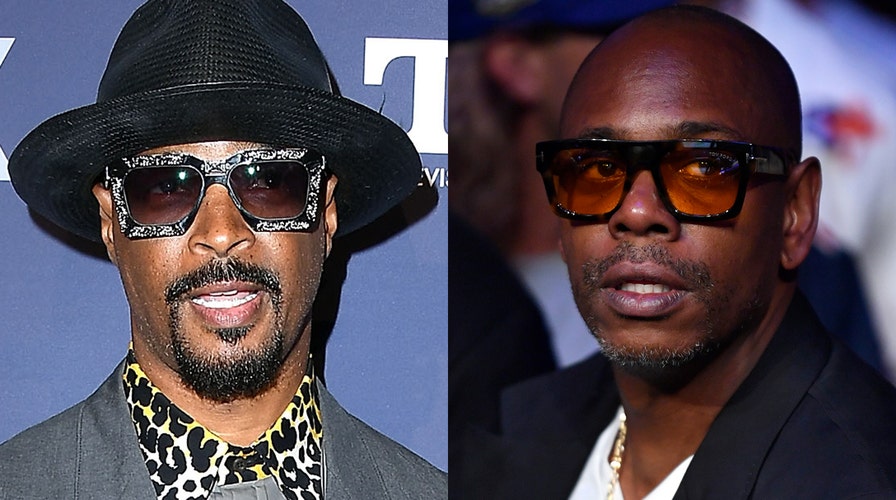Dave Chappelle: The Unfiltered Voice Against Hollywood’s Power Dynamics
Dave Chappelle, the renowned comedian, once again finds himself at the center of controversy following the release of his latest Netflix special, “The Closer.” Known for his fearless approach to comedy and willingness to tackle sensitive topics, Chappelle has stirred debate within the LGBTQ+ community with his remarks. However, amidst the uproar, he has found support from unexpected corners, with fellow comedian Damon Wayans defending Chappelle’s right to free speech.

Wayans likened Chappelle to the legendary artist Vincent van Gogh, applauding his courage to challenge societal norms and speak his mind freely. In an interview with TMZ, Wayans emphasized the importance of artists expressing themselves without fear of censorship or repercussion. He framed Chappelle’s controversial statements as a liberation from the constraints of political correctness, suggesting that Chappelle’s comedy serves as a beacon of artistic freedom in a landscape dominated by cultural sensitivities.
However, Chappelle’s unapologetic approach to comedy has not been without its consequences. Following the release of “The Closer,” Netflix faced backlash from both viewers and employees. Some Netflix workers publicly criticized the streaming platform for “platforming hate speech,” while others, such as showrunner Jaclyn Moore, distanced themselves from the company in protest.

‘); }else{ document.write(‘‘); } –>
Moore, a trans woman, expressed disappointment in Netflix’s decision to air Chappelle’s special, citing concerns about its impact on the LGBTQ+ community. While Moore clarified that she did not seek to “cancel” Chappelle, she questioned Netflix’s commitment to inclusive programming. Her decision to step away from working with Netflix underscored the deep divisions sparked by Chappelle’s comedy and the broader debate over freedom of expression versus accountability.
Meanwhile, within Netflix itself, internal tensions flared as employees clashed over the company’s handling of the controversy. Three employees were suspended for crashing an executive meeting to voice their objections, highlighting the internal strife within the company. Despite the reinstatement of these employees, the incident underscored the challenges faced by corporations navigating the intersection of free speech and corporate responsibility.
Chappelle’s journey through the entertainment industry has been marked by both triumphs and tribulations. From his groundbreaking sketch comedy series “Chappelle’s Show” to his candid stand-up specials, he has remained a provocative and influential figure in popular culture. Yet, his experiences behind the scenes reveal a darker reality of systemic racism and discrimination within Hollywood.
In a candid interview, Chappelle recounted a pivotal moment in his career when executives at Fox suggested changing the lead female character on his show from black to white. Despite his creative autonomy, Chappelle faced pressure to conform to mainstream expectations, highlighting the pervasive influence of systemic racism in shaping Hollywood narratives.
Chappelle’s refusal to compromise his artistic vision reflects a broader struggle for representation and recognition within the entertainment industry. His willingness to confront uncomfortable truths and challenge institutional norms has earned him both admirers and detractors. Yet, through it all, Chappelle remains steadfast in his commitment to authenticity and creative integrity.
As the debate over Chappelle’s comedy continues to reverberate, it serves as a poignant reminder of the complexities of free speech and artistic expression in contemporary society. While some may view his provocative humor as divisive or offensive, others see it as a necessary catalyst for dialogue and reflection. Ultimately, Chappelle’s uncompromising stance against Hollywood’s power dynamics reaffirms the enduring importance of speaking truth to power, even in the face of adversity.
News
Cardi B and Offset show that their relationship is still going strong by spending a date night watching the New York Knicks after a brief breakup.-be
Cardi B and husband Offset proved their relationship was stronger than ever as they stepped out for a mid-week date night on Tuesday evening. The hitmaker, 31, looked smitten with…
Nicki Minaj is described as “delusional” in purported texts by Ice Spice, according to Baby Storme.-be
Baby Storme is back for round two. Today (May 3), the musician leaked another alleged conversation with Ice Spice, who she claimed was her best friend at…
Unbelievable: Depp’s Kid REVEALS How Amber Treated Him-be
Johnny Depp’s daughter, Lily-Rose Depp, has recently made waves by speaking out in defense of her father amid the ongoing legal battle between Depp and his ex-wife,…
Despite Travis Kelce warn Jimmy Kimmel Not to call him ‘Broke Boyfriend’ but Jimmy continued and this what this act have results too.-
Earlier this week, the 34-year-old tight end reached a two-year extension with the Kansas City Chiefs that will make Kelce the highest-paid tight end in the…
Watch: Taylor Swift cry in public over criticizing She’s facing on social media,if you’re a Real fan of Taylor one calm word for her, it’s time Fans show her love,deep love.-be
Why have a double date when you can have a couples vacation? That seems to be exactly what Taylor Swift, Travis Kelce, Gigi Hadid, and Bradley Cooper…
Katt Williams SHOWS PROOFS of Oprah Handling Hollywood CELEBS to Diddy-be
The Controversial Intersection of Influence: Oprah, Celebrities, and Allegations In the realm of Hollywood, where power, influence, and celebrity intertwine, the recent allegations and speculations surrounding Oprah…
End of content
No more pages to load











